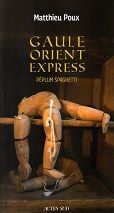Voici ce que j'ai trouvÃĐ sur Early British Kindgoms :
Gawain Gwalltafwyn, King of Gododdin
(Born c.AD 491)
(Welsh: Gwalchmai; Latin: Walganus; English: Gavin)
Gawain was the eldest son of King Lot Luwddoc (of the Host) of Gododdin and his wife Anna. He appears in early Welsh literature as Gwalchmai, the Hawk of May, a very handsome young man who acquired for himself the epithet of Gwalltafwyn meaning "hair like rain". He is, of course, World famous as one of the stars of Arthurian Literature: one of the bravest knights of the Round Table.
From King Arthur's court, Gawain is said to have undergone many adventures: the Green Knight episode, his battle with Carl of Carlisle and his famous marriage amongst them. In the latter two stories, he is particularly associated with Caer-Ligualid (Carlisle), thus showing his Northern British roots. Little is actually known of his reign in Gododdin when he eventually succeeded his father. He appears in the king lists as Serguan, a form of the Welsh name 'Serwan,' but this has probably been influenced by literary sources and represents Sir-gawain. Tales of his knightly exploits abroad may indicate that he was largely an absentee-king. Perhaps he spent time conquering other lands for he is also strongly associated with Galloway and Walwyn's Castle in Pembrokeshire, both of which were supposedly named after him.
In later years, Gawain is said, by some, to have abdicated in order to lead a saintly life on the Pembrokeshire Coast. Irish pirates once pursued him along the shore here until he managed to hide in a cleft in the rock. The fissure closed up to conceal Gawain and, in thanks, he established his small hermitage on the spot still known at St. Govan's head. Nearby is Huntsman's Leap, a deep chasm between the cliffs. The Devil is said to have told a man, who had sold him his soul, that he would forgo payment if the fellow could ride across this impossible jump. The canny debtor persuaded St. Govan/Gawain to bless his horse and thus made it clean across the divide!
When Gawain died, he is said to have been buried under the altar in his little chapel. He was succeeded in Gododdin by his son, Cawrdaf, though little is known of his descendants. They appear to have continued to rule the kingdom for a number of generations, probably until the Northumbrian conquest of AD 638.
En gros un roi du Gododdin, prÃĐsent dans les gÃĐnÃĐalogies sous le nom de "Serguan", fils de Loth de Gododdin qui a laissÃĐ son nom à la rÃĐgion : le Lothian, et ÃĐventuellement devenu saint aprÃĻs avoir abdiquÃĐ.
Quels auraient pu Être les liens possibles entre lui et Arthur ?
J'ai lu quelque part que le prÃĐnom Breton "Goulven" dÃĐriverait de Gauvain/Walwen/Gwalchmai.


